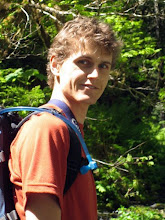Budapest pulls off a much better attempt at this whole tourism bit. It's still a bit much for my tastes, but I can interest myself in several days of this richly historical crossroads of culture. It feels calm and quiet compared to the early-June crush of Istanbul. I can even spot authentic (read: genuine) Magyars, here and there.
The language barrier is unusually large, as Hungarian falls into a language group entirely separate from our loving Indo-European family of languages. This language barrier caused me no little grief, especially as regards my seventh favorite pastime: striking up conversations with interesting-looking random people.
(As and aside, this pastime sometimes bites me in the ass, metaphorically speaking. See penultimate paragraph.)
Arriving in Budapest after our flight from Sighişoara, my parents and I had a short wait at the still smallish airport for the hotel shuttle. We had reservations at what guidebooks bluntly referred to as the centrally located but uncharming Hotel Charles. Compared to the warmth and readily helpful staff of our series of hotels in Romania, the lack of charm at Hotel Charles felt more like icy disregard for standards in the business of hospitality. Or it would have felt chilly, if the air conditioning had extended beyond the reception and the halls.
As it turns out, Hotel Charles also lacks centrality. While its distance from the center is not large, it certainly is on the margin of Budapest's touristy area. As such, the decision was easily made to spend as little time as possible at the hotel. Our first evening in town, my parents and I spent gaining as sense of the city center. In this effort, we explored the area of Pest near the heavily swollen waters of the Danube. Our arrival in Budapest happily coincided with some festival, which had turned the beautiful Chain Bridge into a pedestrian-only path of street performers and trinket vendors, bounded on each end with stages for live music. With a wide selection of beer, wine, and snacks, we enjoyed the music and energetic crowd.
In the following days, my parents cleverly taxed my endurance for guided tours and sightseeing excursions, to the limit. They did this via a "Hop On, Hop Off" package, which involved sitting in an uncovered bus under searing heat, watching fascinating sights pass by as a recorded voice casually outlined all of the places we would not be going inside as long as we stayed on the bus. At the end of the bus tour, we ate lunch and caught an altogether uninspired sightseeing boat which carried us up and down the river, with suspiciously similar prerecorded explanations of passing points of interest.
Among these points of interest, the Parliament building and the Matthias Church complex were the most captivating. It would be a vast understatement to say that Pest's riverside palace which houses Hungary's parliament is ornate. Covered in spires, gargoyles, intricate carvings, and vast arrays of arched windows, the building would be hard to resist, no matter what angle one comes from. If that weren't enough, though, the building was constructed after winning an architectural bidding contest around 1880. However, the government was so impressed by the second- and third-place runners-up that it had them built adjacent to the magnificent first-place winner. Tour guides say (with some pride noticeable in their voices) that it is the only place in the world to have simultaneously built three parliament buildings, side by side.
The Matthias Church complex is also a grand imposition, though this time sitting not on Pest's shore of the Danube. The church overlooks the city from Buda's primary hilltop. While the church was (of course) covered in scaffolding and largely obstructed, pictures suggest a stunning structure. However, the church does not stand alone. Surrounding the church is a series of unscathed, white stone walls and towers. The area was entirely overrun by busloads of tourists while I was there, but the beauty of the place still pushed through. The church was the coronation site for many important rulers of Hungarian history. Such coronation ceremonies would begin at the church and then wind down the hill to cross the chain bridge, directly below. Now, Buda's pricey but classic-looking funicular provides a more kingly (and quick) descent. We kindly passed on the funicular, opting instead to explore the ancient streets in the quarter adjacent to the church. This was a great option, as the old streets were quaint and slightly more quiet. The only significant marring of this old castle-church complex is the ugly, tinted glass Marriott hotel, which alternately casts a shadow or reflects a brownish tint on the historical church. I hope the shameless guests at this hotel saw nothing but the church scaffolding from their 1970s-style windows. Heh heh...
Budapest was a bust, as far as I am concerned. The sights mentioned above were great, and the lively violinist at our dinner was brightening. But the crowds and huge sprawl of the city, compounded by scam artists and bold prostitutes, made my memories of Budapest less than gleeful. Maybe if I had been staying in hostels, wandering the city under the setting sun and moonlight, propelled along by coffee and great beer, I would have had a more pleasant experience. Then again, maybe Budapest's enormous size (by my standards) made it less than ideal for me, by default. Indeed, my favorite stops on this trip have been the tiny towns and villages. In any case, despite their wearing effect on the soles of my feet, my company was still great, and the journey continued. On that note...
We eventually concluded our days in Budapest with a relaxed stroll near Buda's newer citadel. After happily checking out of the drab Hotel Charles, we hailed a cab to the train station. Our next stop would turn out to be one of the best on the trip: Krakow, Poland.
Happy. Thank you. More Please.
13 years ago

